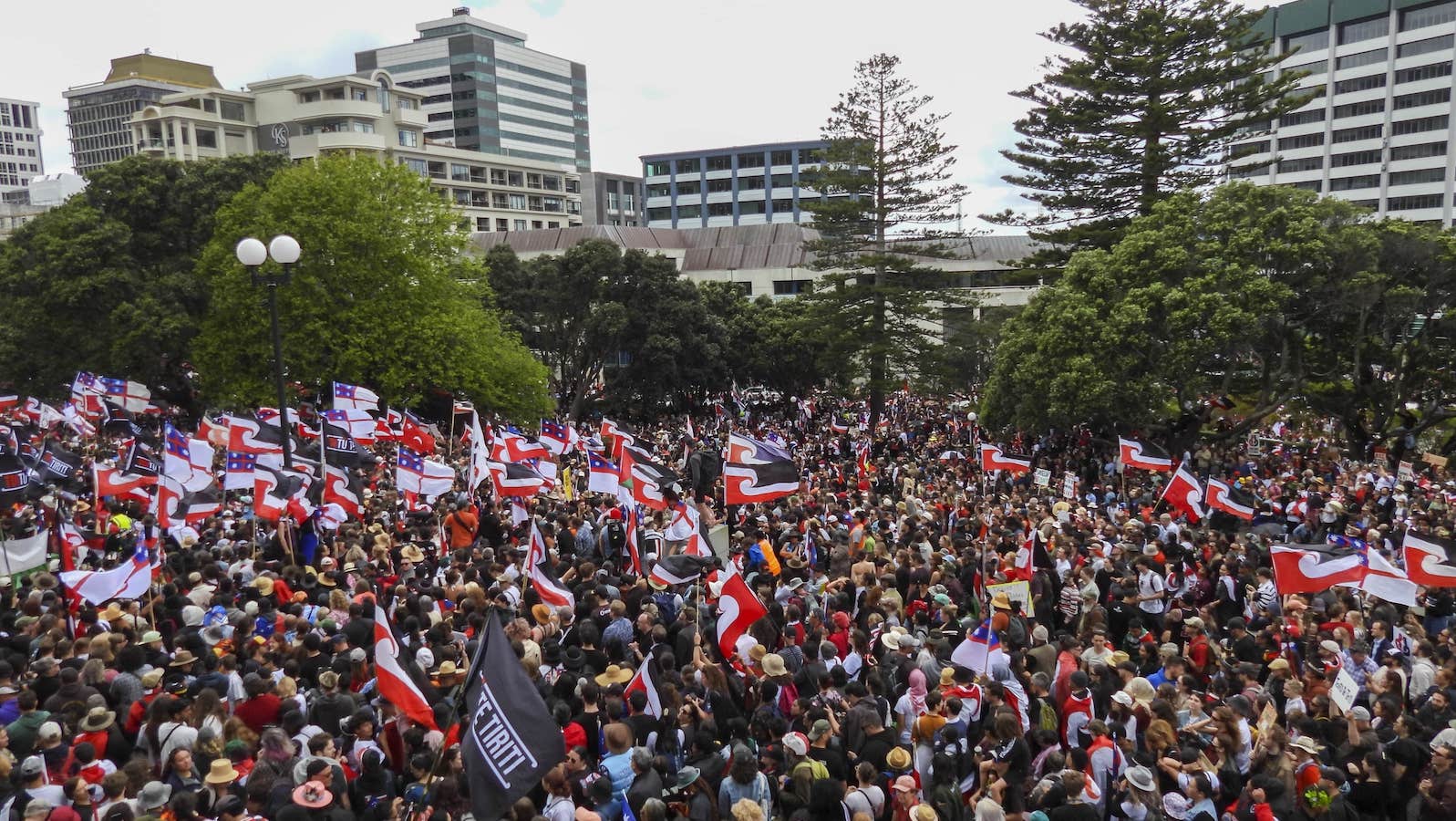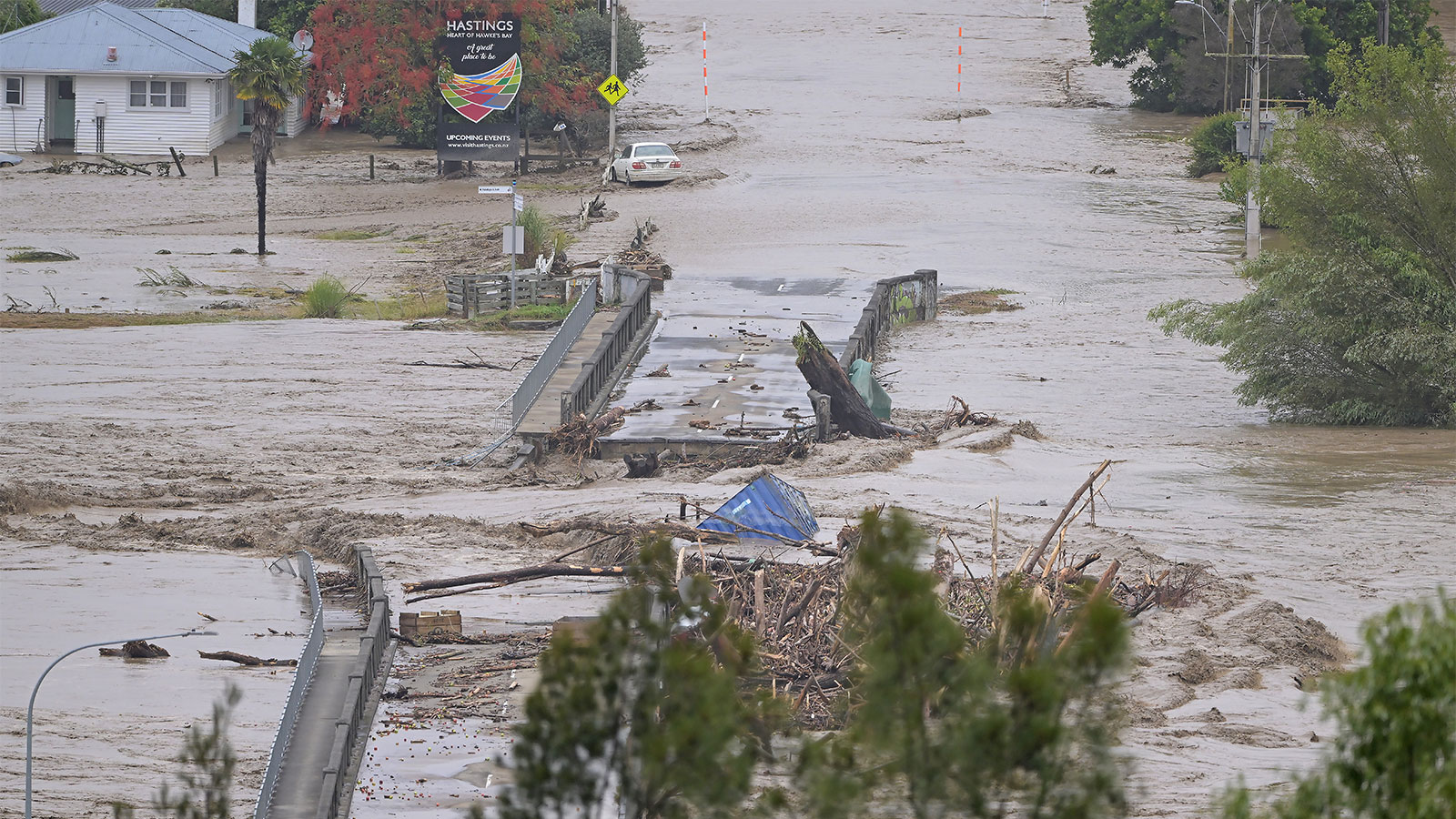Earlier this week, tens of thousands of people converged on Aotearoa New Zealand’s Parliament in a show of solidarity against a legislative onslaught against Indigenous rights.
They had marched peacefully for nine days, in what Māori peoples call hīkoi, in an effort to stop the country’s new right-wing government from forcing through a bill that would dilute Indigenous influence on the government by reinterpreting one of its founding documents.
“Māori have been here, we are going to be here forever. You’re never going to assimilate us,” said Catherine Murupaenga-Ikenn, one of the Māori activists who participated in the hīkoi. “This is a great time for revolution.”
Proponents describe the Treaty Principles bill as a push for equal rights for all citizens of Aotearoa, which is how Māori refer to New Zealand: an effort to define principles underlying the Treaty of Waitangi, an English-language agreement signed by some of the country’s colonizing founders and Indigenous Māori that gave the Crown the right to govern the nation in exchange for enshrining Māori rights.
“Did the treaty give different rights to different groups, or does every citizen have equal rights? I believe all New Zealanders deserve to have a say on that question,” said David Seymour, a member of Parliament who leads ACT New Zealand, the country’s right-wing party. (Seymour has Māori ancestry, but leaders of his tribe do not claim him.)
But Māori opponents say the measure would weaken Indigenous rights that not only help address long-standing social and economic inequities but are critical to protecting the country’s lands and waters.
“That redefinition could diminish Māori participation and environmental governance, as the treaty currently ensures that Māori involvement in managing national natural resources,” said Mike Smith, a Māori climate activist who has two climate lawsuits pending before the country’s high court. “So by limiting these rights, the bill may weaken the environmental stewardship practices that are rooted in Māori morals and values and thereby impact the country’s ability to address all the environmental challenges, and more particularly combat climate change effectively.”
Seymour pushed back on that characterization. “If it’s true no country can do conservation without something like the Treaty of Waitangi, the world is in trouble,” he said. “In any event, New Zealand has had its current conception of the treaty for over 30 years, and we are a solid, but not the best, environmental regulator, so others clearly do better without something like the treaty.”
The Treaty Principles bill isn’t expected to pass in the current Parliament, although it could eventually head to a referendum. But it’s just one part of a broader right-wing backlash against the significant gains that Māori have made in recent decades to win back stolen land and secure better representation and co-governance of government agencies.
“This is not just about Māori interests and rights. This is about the protection of all that we hold dear,” said Māori activist Tina Ngata, who has been hosting online education sessions about the bill. “Indigenous rights have been one of the strongest roadblocks to corporate exploitation.”
Ngata was part of a successful push in 2018 to get Aotearoa New Zealand to ban oil and gas exploration in its waters. The country’s right-wing government, which vaulted into power last year, is now pushing to reverse that ban.
The government wants to double its mineral mining exports to $2 billion over the next decade, and has delayed a planned tax on agricultural emissions. It also repealed the Māori Health Authority — which addresses Indigenous health disparities, many of which are expected to worsen with climate change — and is in the processes of deleting references to the Treaty of Waitangi from existing laws.
Smith said that even though his climate litigation isn’t specifically based on the treaty, it lends critical weight to his arguments regarding the government’s obligation to protect the environment.
A website promoting the Treaty Principles bill says it wouldn’t have an effect on co-governance of Aotearoa New Zealand’s rivers and mountains, such as the Tūpuna Maunga Authority that gives Māori tribes of Auckland a say in how the city’s volcanic mountains are managed. It would, however, remove Māori co-governance of the country’s water services, which has been controversial since the prior government announced plans to nationalize water management.
Smith sees the measure as an effort to play upon the fears of the non-Māori population and make it easier for private interests to profit. “It’s an indicator that they want to stomp on Māori rights and philosophies and worldviews. It’s an indicator that they just are refusing to fight the challenge that climate change and the global biodiversity crisis demands of us,” he said.
But he has been heartened by the huge amount of support for the Māori cause. A video of a Māori legislator leading the haka in Parliament went viral on social media, underscoring the force of the opposition, which expands beyond Māori peoples and includes a former prime minister and prominent lawyers, health care professionals, translators, church leaders, and the Waitangi Tribunal, a federal commission dedicated to reviewing Māori claims regarding the treaty.
That commission is expected to hold a hearing next week to consider the question of whether the Aotearoa New Zealand government has violated Māori rights in its response to climate change. The hearing has been overshadowed by the Treaty Principles controversy, but Smith is watching it closely. The tribunal only has the power to make recommendations, and can’t force the government to do anything, but its findings could help strengthen Smith’s climate cases before the high court.
The debate is complicated by the fact that a vast majority of Māori chiefs signed Te Tiriti o Waitangi, a Māori-language treaty that never relinquished sovereignty. But for many years, the New Zealand government has relied on an English-language translation of the document, which does not match the Māori text. Murupaenga-Ikenn adds that for nearly a century, that incorrect translation has been elevated by the government to the status of actual “treaty”, giving the new government the opportunity to reinterpret its principles, despite its origins as a translated artifact.
Murupaenga-Ikenn said she’s been excited by how the Treaty Principles bill has spurred her people into action. She was part of a massive hīkoi 20 years ago to rally in favor of Indigenous ownership of the seabed, but last week’s gathering was far larger, with as many as 55,000 people, and activists hope it’ll bleed into more local protests and stronger voter participation.
If she saw Seymour, the ACT politician behind the bill, Murupaenga-Ikenn said she would thank him. “Thank you very much for putting a reenergized fire under my people to just shake us up and wake us up,” Murupaenga-Ikenn said. “The time is now for a revolution. Thank you, David Seymour.”
This story has been updated.






